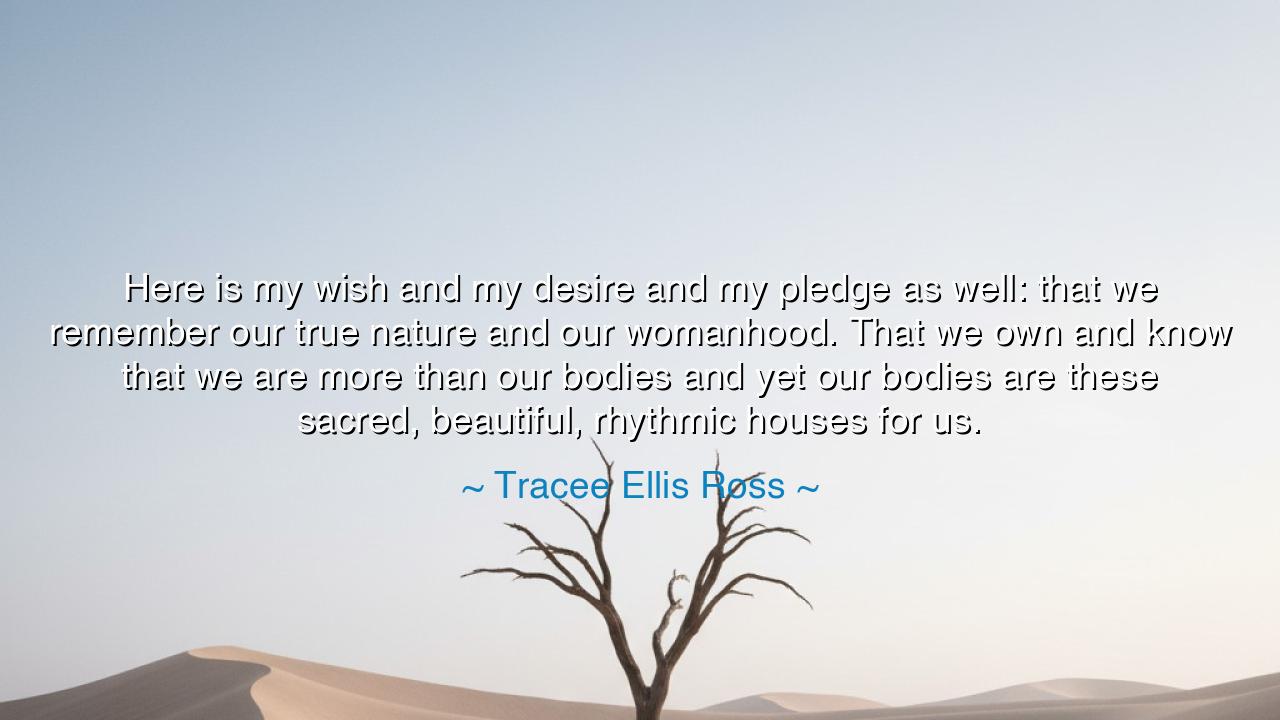
Here is my wish and my desire and my pledge as well: that we
Here is my wish and my desire and my pledge as well: that we remember our true nature and our womanhood. That we own and know that we are more than our bodies and yet our bodies are these sacred, beautiful, rhythmic houses for us.






Tracee Ellis Ross once spoke with the gravity of one delivering a sacred vow: “Here is my wish and my desire and my pledge as well: that we remember our true nature and our womanhood. That we own and know that we are more than our bodies and yet our bodies are these sacred, beautiful, rhythmic houses for us.” These words rise like a hymn to the divine feminine, calling women — and indeed all humanity — to reclaim the wholeness of identity, to honor the body without being enslaved by it, and to recognize the soul that shines through it.
The meaning of this quote is rooted in balance. Ross insists that women are more than their bodies — that their value cannot be reduced to physical form or appearance, as society so often attempts. And yet, she does not call for a denial of the body; instead, she names it as sacred, a vessel of rhythm and beauty, a temple that houses the soul. This is no rejection of flesh, but an elevation of it to its rightful place: not as a cage, but as a sanctuary.
The origin of this wisdom can be traced to both spiritual traditions and lived struggles. In ancient myth, the goddess was both mother and warrior, nurturing and fierce, body and spirit entwined. In modern history, women have been pressured to view their bodies as commodities or obstacles, while their inner strength was overlooked. Ross’s words stand in this long lineage of reclaiming womanhood, asserting that the true nature of women is expansive, transcending societal boundaries, yet grounded in the sanctity of the body they inhabit.
History gives us examples of women who embodied this truth. Consider Sojourner Truth, who stood before a crowd and declared, “Ain’t I a woman?” Her words challenged those who would confine womanhood to delicate fragility, reminding the world that strength, endurance, and spirit belong equally to the feminine. Or Frida Kahlo, whose body was wracked with pain, yet who transformed her suffering into art that proclaimed the beauty and rhythm of her own lived experience. Both women lived the wisdom Ross names: that womanhood is more than flesh, yet flesh itself is imbued with power and meaning.
Ross also speaks of a pledge — a commitment to remembering. This is no passing thought, but a vow to hold fast to truth in the face of a world that forgets. The modern age often teaches women to despise their bodies or to define themselves solely by them. Her words are a counter-song, urging each listener to remember that the body is a house for the soul, worthy of reverence, but never the full measure of one’s being.
The lesson for future generations is both liberating and grounding: never allow your worth to be reduced to the surface of your form, yet do not despise the body you inhabit. Treat it as a temple, worthy of care, rhythm, and celebration. Remember that your essence lies in spirit, creativity, compassion, and strength, but that your body is the vessel through which this essence touches the world.
Practical action follows this wisdom. Care for your body as sacred — nourish it, move it, rest it — not to conform to external ideals, but because it houses your spirit. At the same time, cultivate the soul within: pursue wisdom, creativity, justice, and love. And above all, teach the next generation that their worth does not rise or fall with beauty standards or appearances, but rests in their true nature, which no outside gaze can diminish.
Thus, Tracee Ellis Ross’s words echo as both prayer and commandment: we are more than our bodies, yet our bodies are holy vessels. To forget this truth is to live divided; to remember it is to live whole. Let her pledge become ours, that we honor both body and spirit, and walk in the fullness of our humanity, radiant and unashamed.






AAdministratorAdministrator
Welcome, honored guests. Please leave a comment, we will respond soon